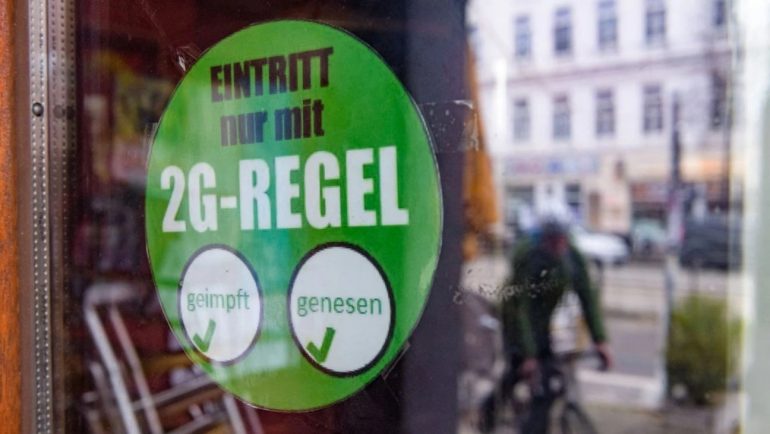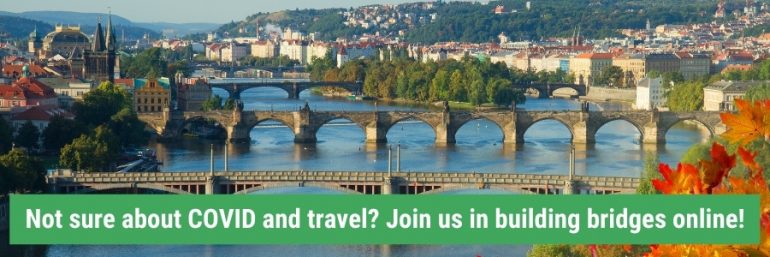WEEC2022: “2G” policy for the onsite participation
 Three months remain to the 11th World Environmental Education Congress in Prague. Despite our hopes, the world still struggles with the global pandemia of COVID-19. In Central Europe, we experience the new wave of this infection. At the same time, we have more reasons for optimism than a year ago. The new vaccines provide a reasonable level of protection against severe illness. Based on the previous experience and the contemporary pandemic speed, we have good reasons to expect the situation to improve by the end of winter.
Three months remain to the 11th World Environmental Education Congress in Prague. Despite our hopes, the world still struggles with the global pandemia of COVID-19. In Central Europe, we experience the new wave of this infection. At the same time, we have more reasons for optimism than a year ago. The new vaccines provide a reasonable level of protection against severe illness. Based on the previous experience and the contemporary pandemic speed, we have good reasons to expect the situation to improve by the end of winter.
After consideration, we decided to keep the hybrid form of WEEC as it is planned. You are welcome to participate in either online or onsite forms. You may also use the mix of both worlds – you can register onsite but participate online in plenary sessions or other parts of congress. Please, find the way that works best for you.
For the onsite participation, we adopt the “2G” policy. As a result, we will ask participants to prove that they are either fully vaccinated or have recently recovered from COVID-19. We hope you understand this requirement – we want to make our meeting safe for everyone. We are looking forward to meeting you – either online or in Prague – in March 2022! Keep safe and healthy


 As educators and environmental educators of the WEEC Network, having overcome these difficult months of lockdown, we feel more than ever the importance of dedicating a focus to teaching methodologies.
As educators and environmental educators of the WEEC Network, having overcome these difficult months of lockdown, we feel more than ever the importance of dedicating a focus to teaching methodologies. Gunter Pauli, the founder of ZERI (Zero Emission Research and Initiatives) and the Blue Economy, invites everyone to reflect and ask questions, starting with those of his book “100 Questions in 100 Pages”. An invitation to question the origins and implications of this virus and to understand how to overcome the crisis, together, by using confrontation. A declaration of love to stimulate debates and change. The book is
Gunter Pauli, the founder of ZERI (Zero Emission Research and Initiatives) and the Blue Economy, invites everyone to reflect and ask questions, starting with those of his book “100 Questions in 100 Pages”. An invitation to question the origins and implications of this virus and to understand how to overcome the crisis, together, by using confrontation. A declaration of love to stimulate debates and change. The book is The Journalism Update Course for Sustainability is organised by CapacitaRSE – a pioneering center for teaching sustainability in Latin America – with the experience of 30 journalists or communicators (bloggers, podcasters or others) active in the field in the Spanish-speaking world.
The Journalism Update Course for Sustainability is organised by CapacitaRSE – a pioneering center for teaching sustainability in Latin America – with the experience of 30 journalists or communicators (bloggers, podcasters or others) active in the field in the Spanish-speaking world. I follow the news with a heavy heart. I see images of health workers, care-givers, and people in the front-lines and pay my tributes to their courage and sacrifices.
I follow the news with a heavy heart. I see images of health workers, care-givers, and people in the front-lines and pay my tributes to their courage and sacrifices.
 Environmental Education is in quarantine too.
Environmental Education is in quarantine too. The world environmental education network (WEEC) is close to everyone in these long months who are experiencing painful moments and a situation of social isolation all over the world.
The world environmental education network (WEEC) is close to everyone in these long months who are experiencing painful moments and a situation of social isolation all over the world.